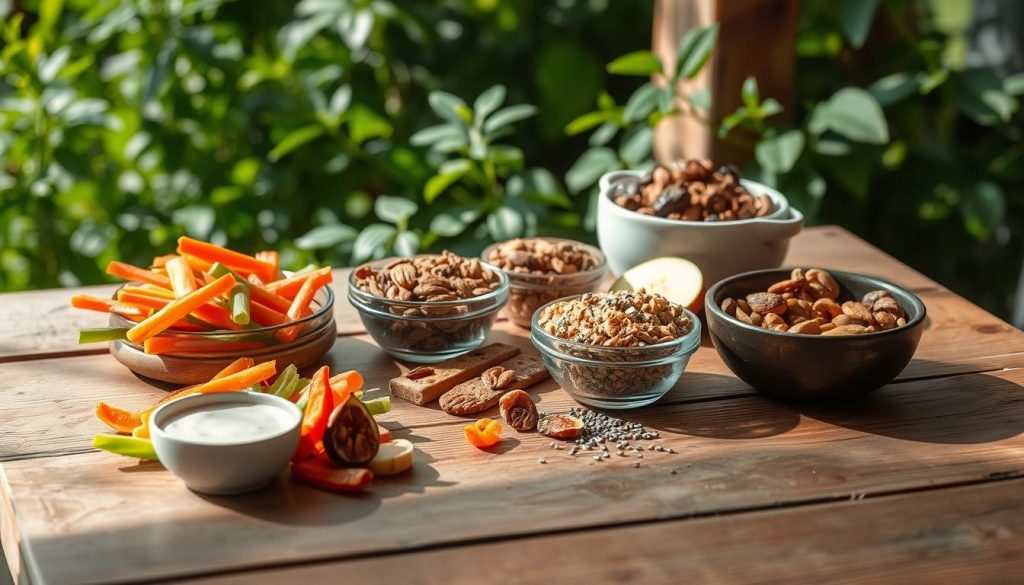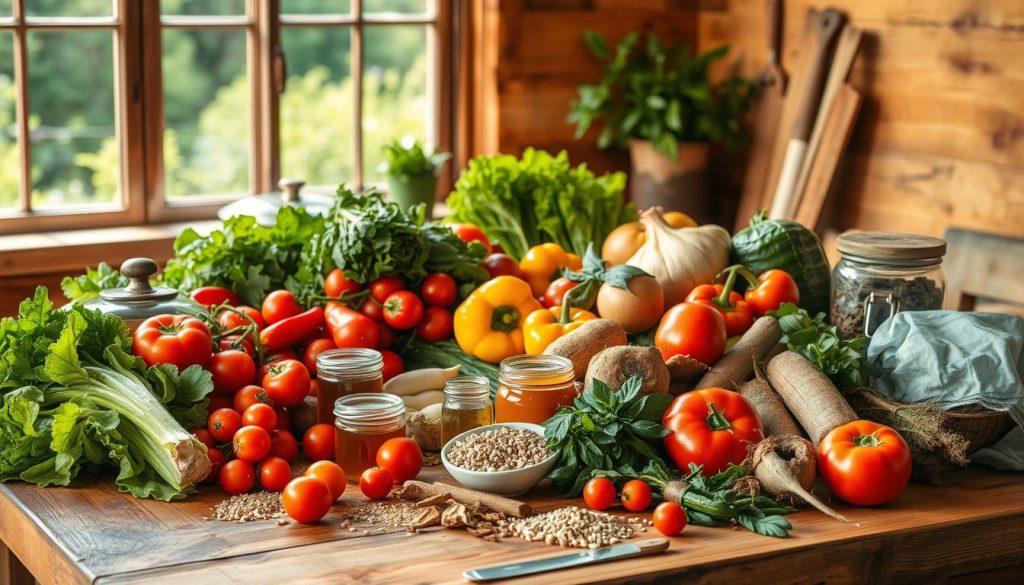Turn your meals into chances to nourish yourself and the planet. Organic meals lead to better health and help the environment. Each bite of healthy food fuels your body and supports the planet’s future.
We’re here to help you start this journey. You’ll find easy, fun ways to make healthy meals. From breakfast to dinner, we’ll inspire you with tasty, value-based meals. This path begins with seeing how organic choices benefit you and the community.
Key Takeaways
- Organic eating boosts energy and supports long-term health.
- Healthy recipes can fit any diet, from plant-based to family-friendly.
- Nutritious dishes made with organic ingredients taste better and reduce exposure to harmful chemicals.
- Small changes like choosing organic staples create big environmental benefits.
- Discover budget-friendly ways to enjoy organic meals without extra cost.
Why Organic Eating Transforms Your Health and the Planet
Choosing organic meal ideas boosts health and safeguards ecosystems. Sustainable cooking limits pesticide use. This leads to nutrient-rich fresh ingredients that fuel vitality. Research shows this boosts immunity and prevents disease.
“Organic farming reduces pesticide runoff by 90%, protecting ecosystems.” – USDA
These practices improve soil health, biodiversity, and carbon storage. Even small changes, like one organic dish a week, make a big difference.
Begin with small steps toward sustainable cooking. Every meal with fresh ingredients is a step toward a healthier you and planet.
Building Your Organic Pantry: Essential Ingredients for Success
Turn your kitchen into a place of healthy creativity with an organic pantry. These key items make easy meal prep simple and open up many organic meal ideas. Focus on grains, seasonings, pantry staples, and smart storage.
Staple Organic Grains and Legumes
Organic grains and legumes are key for balanced meals. Choose quinoa for salads, farro in soups, and lentils for curries. Keep them in airtight containers to stay fresh. Try boiling beans for 2 minutes, then soak for 1 hour instead of overnight.
- Quinoa: Gluten-free, cooks in 15 mins
- Brown rice: Pair with black beans for a protein-packed bowl
- Chickpeas: Blend into hummus or roast as a crunchy snack
Must-Have Organic Herbs and Spices
| Herb/Spice | Flavor Profile | Best Use |
|---|---|---|
| Rosemary | Piney aroma | Roasted vegetables |
| Cumin | Earthy warmth | Latin-inspired dishes |
| Cinnamon | Sweet-spicy | Oatmeal or chili |
Buy organic dried oregano for more antioxidants. Grow fresh basil in a pot. Change stock every 6 months for the best taste.
Organic Oils, Vinegars, and Condiments
Essentials like apple cider vinegar and nut butters add flavor without additives. Choose oils carefully:
| Oil | Smoke Point | Best For |
|---|---|---|
| Extra Virgin Olive Oil | 320°F | Salad dressings |
| Avocado Oil | 520°F | High-heat frying |
| Coconut Oil | 350°F | Asian stir-fries |
Smart Storage Solutions for Maximum Freshness
Keep food fresh with these tips:
- Use glass jars for grains to block light
- Freeze herbs in olive oil cubes
- Label containers with purchase dates
Try Stasher silicone bags for produce or Pyrex containers for bulk items. Good storage cuts waste and keeps fresh ingredients tasting great.
Rise and Shine: Nourishing Organic Breakfast Ideas
Starting your day with purpose gives you energy and focus. We’ve picked healthy recipes and nutritious dishes to make mornings bright and healthy. They use fresh ingredients to start your day right.
Quick Morning Smoothie Bowls
Make breakfast a work of art with smoothie bowls. Mix organic fruits, veggies, and protein for a boost. Try our nutrient-dense mix: frozen spinach, frozen mango, almond butter, and chia seeds. Add granola, coconut flakes, and edible flowers for a pretty look.
- Summer: Pineapple, kale, and turmeric
- Fall: Pumpkin purée, cinnamon, and walnuts
Save time by freezing pre-portioned ingredients.
Wholesome Overnight Oats Variations
Overnight oats are a quiet superfood. Soak rolled oats with plant-based milk for a nutrient boost. Try these seasonal combos:
| Season | Base | Toppings |
|---|---|---|
| Spring | Mango-lime coconut milk | Chia seeds, shredded coconut |
| Winter | Apple-cinnamon almond milk | Cranberries, pistachios |
| Summer | Blueberry-almond milk | Granola, fresh mint |
Enjoy with fresh fruit or a drizzle of honey for nutritious dishes that taste like treats.
Savory Breakfast Options for Busy Weekdays
Break free from syrup-laden routines with savory options. Try:
- Vegetable frittatas baked the night before
- Chickpea flour crepes filled with roasted veggies
- Miso soup with spinach and soft-boiled eggs
Use last night’s roasted veggies in breakfast bowls for zero-waste mornings. These healthy recipes show savory can be as quick as sweet.
Midday Fuel: Fresh and Satisfying Organic Lunch Options
Make your lunchtime better with organic meals that boost your energy. Plant-based meals and fresh ingredients are key to tasty and energizing lunches. They’re perfect whether you’re at work or at home.
- Grain bowls: Layer quinoa or farro with roasted veggies, chickpeas, and a zesty tahini drizzle.
- Sandwich upgrades: Use whole-grain bread with hummus, spinach, and seasonal produce like roasted eggplant or zucchini.
- Salads with staying power: Mix leafy greens with marinated tofu, sunflower seeds, and a citrus vinaigrette for a plant-based boost.
Batch cooking on weekends saves time. Chop veggies, cook grains, and marinate proteins in advance. Pack meals in airtight containers for the week. Easy meal prep ensures variety without daily stress. Leftover roasted sweet potatoes become a quick lunch when paired with avocado and salsa.
Your lunch is your daily reset—don’t rush it. Savor flavors that reconnect you to real food.
Choose containers that keep ingredients separate until you’re ready to eat. Mason jars or compartmentalized boxes work well. Add fresh herbs or lemon wedges last-minute to preserve crispness. These choices turn lunch into a highlight of your day, not an afterthought.
Farm-to-Table Dinner Recipes That Wow
Turn everyday dinners into special moments with farm-to-table meals. These meals celebrate fresh, organic ingredients. They’re perfect for weeknights or big gatherings, making sustainable cooking a work of art.
One-Pot Organic Wonders
One-pot meals are great for busy lives. They’re full of flavor. Try these seasonal combinations:
| Season | Dish | Key Ingredients |
|---|---|---|
| Summer | Ratatouille | Zucchini, eggplant, bell peppers |
| Winter | Root Vegetable Stew | Carrots, parsnips, potatoes |
| Spring | Asparagus Risotto | Arborio rice, leeks, peas |
Plant-Based Protein Powerhouse Dinners
Explore global flavors with meatless meals. Try tempeh in tacos or lentil-cumin stew with rice. These ideas show plant-based cooking can be hearty and new.
- Mexican black bean enchiladas with queso fresco
- Indian chana masala with turmeric-spiced cauliflower rice
- Thai jackfruit “pulled pork” sliders on whole wheat buns
Family-Friendly Organic Comfort Foods
Make classics healthier with nourishing twists. Use whole grains and add veggies in creative ways:
- Butternut squash mac & cheese with cashew sauce
- Lentil shepherd’s pie with sweet potato topping
- Mushroom stroganoff over farro
Gourmet Organic Meals for Special Occasions
Make celebrations special with dishes that highlight premium organic ingredients:
Pair heritage grain salads with heirloom tomatoes. Use artisanal miso paste in soba noodle bowls. For a wow factor, try:
Truffle-infused wild mushroom risottoorheritage pork loin with chestnut stuffing. Shop at local farmers markets for seasonal ingredients to boost flavor and reduce waste.
Every dish here shows organic cooking can be both easy and amazing. Start by changing one ingredient at a time. Let the seasons inspire your cooking. Your kitchen becomes a place of health and joy with farm-to-table meals.
Between-Meal Bliss: Simple Organic Snacks and Sides
Snacking doesn’t have to be a compromise. With nutritious dishes made from organic ingredients, every break becomes a chance to nourish your body. Our easy meal prep strategies ensure even busy days stay on track. These ideas keep your energy steady and cravings at bay, turning snacks into part of your wellness routine.

- Roasted Chickpeas: Toss with olive oil and spices for a crunchy, protein-packed snack. Store in airtight containers for the week.
- Apple & Nut Butter Packs: Pair sliced apples with Justin’s Organic almond butter or NuttZo sunflower butter for a portable, balanced treat.
- Quick Energy Bites: Blend dates, walnuts, and cocoa powder into balls. Freeze extras for instant energy boosts.
- Vegetable Platters: Prep carrot sticks, bell peppers, and snap peas with Annie’s Organic hummus for a nutrient-rich option.
These healthy recipes are designed for convenience. Opt for grab-and-go options like La Tourangelle roasted almonds or Mary’s Gone Crackers with mashed avocado. For longer outings, pack quinoa salad jars (pre-cooked grains mixed with veggies and lemon dressing) that double as sides or light meals. Smart prep ensures you’re never without something wholesome to eat.
Organic snacking isn’t just about avoiding processed foods—it’s about savoring flavors that energize. By prioritizing easy meal prep, you’ll discover how simple choices add up to big health wins. Let’s make every snack count, one mindful bite at a time.
Seasonal Organic Meal Ideas to Celebrate Nature’s Bounty
Embracing the seasons brings vibrant flavors and nutrition. Learn to make meals that celebrate each season’s gifts. Use farm-to-table meals and fresh ingredients.
Spring’s Fresh Offerings
Spring brings delicate greens and tender veggies. Enjoy them in simple dishes like blanched asparagus with lemon or pea shoots in citrus vinaigrette. Add wild flair with foraged ramps and edible flowers in salads.
Roast young artichokes with garlic for a nutrient-rich side. These recipes celebrate nature’s renewal and encourage enjoying flavors at their best.
Summer Harvest Delights
Summer means meals that keep kitchens cool. Try grilled corn with chili-lime drizzle or heirloom tomato salads with balsamic glaze. These dishes preserve freshness.
Freeze berries or quick-pickle cucumbers to enjoy all year. Outdoor feasts with seasonal peaches or grilled zucchini bring joy and connection.
Autumn’s Hearty Treasures
Autumn invites cozy meals like maple-glazed carrots or spiced butternut squash soups. Roast root veggies with cumin and apple slices. Try pear-stuffed acorn squash for a unique dish.
Keep apples and onions fresh for weeks with proper storage. This extends the season’s harvest into winter.
Winter Warming Comfort Foods
Winter’s crops make soul-warming meals: slow-simmered lentil soups or cabbage rolls with winter squash. Blend preserved summer tomatoes into stews. Add citrus’s brightness to roasted Brussels sprouts.
These recipes turn simplicity into nourishment. They meet winter’s need for deep nourishment.
Eating Organic Without Breaking the Bank: Budget-Friendly Approaches
Living an organic lifestyle doesn’t have to cost a lot. With sustainable cooking and smart choices, you can enjoy healthy meals without spending a lot. Focus on buying organic for items like fruits and leafy greens. These are where organic makes a big difference in reducing pesticide intake.
- Buy in bulk from stores like Costco or Aldi for grains, beans, and spices—store staples in airtight containers.
- Shop seasonal produce at farmers’ markets or through CSA programs to save up to 30% on fresh organic options.
- Master easy meal prep techniques: batch-cook grains, roast vegetables, and freeze portions for quick dinners.
- Repurpose leftovers into soups or stir-fries to cut waste and stretch ingredients further.
“Planning meals around what’s on sale or in season is the cornerstone of budget-friendly organic eating.”

Pair plant-based meals with occasional organic proteins to balance costs. Frozen organic veggies and pantry staples like lentils offer excellent value. Making small changes, like choosing organic once a week, can help. It’s a step towards a healthier diet and saving money.
Conclusion: Embracing an Organic Lifestyle One Meal at a Time
Every organic meal you make is a step towards a better future. It’s for your health and the planet. The organic meal ideas in this guide are more than just recipes. They help you build a sustainable and fulfilling routine.
Choosing organic ingredients is part of a movement. It cares for both your body and the Earth. By doing this, you support farmers who protect our soil and water.
Sustainable cooking is about making progress, not being perfect. Every time you pick organic grains, herbs, or seasonal produce, you help. Start with small changes, like using organic oats for breakfast or a plant-based dinner once a week.
Life can be unpredictable, with travel, social events, or busy days. But being flexible is important. Freeze leftovers, prep ingredients ahead, or adjust meals to fit your schedule. Every organic choice you make adds up, creating lasting habits.
Let curiosity lead you to new organic meal ideas. Try new things as the seasons change or experiment with pantry staples. Share meals with friends and family to make sustainable cooking fun, not a chore. Every mindful choice you make celebrates your health and the planet’s.
See this journey as an adventure, not a list to follow. Whether you’re making smoothie bowls or seasonal soups, remember each dish is a vote for a healthier world. Keep exploring, adjusting, and enjoying the flavors of a lifestyle that nourishes you and the environment. Wellness is built one mindful meal at a time.


